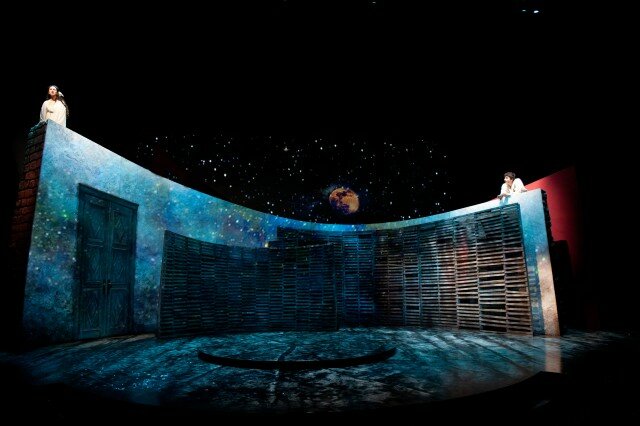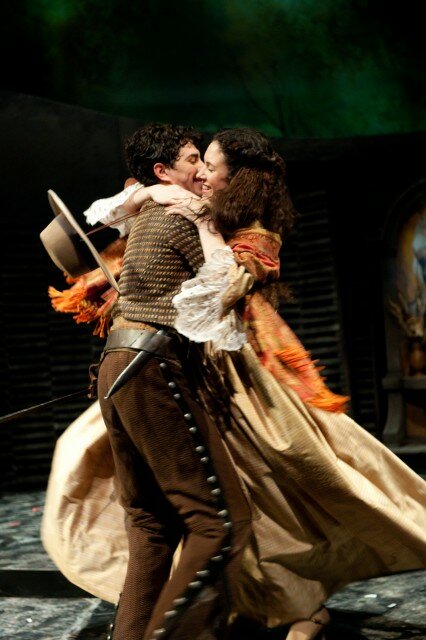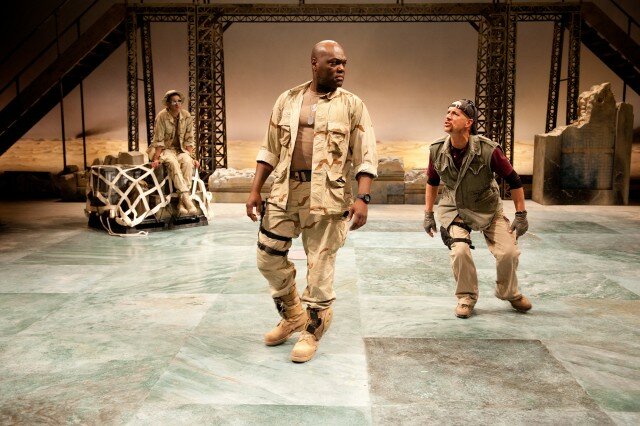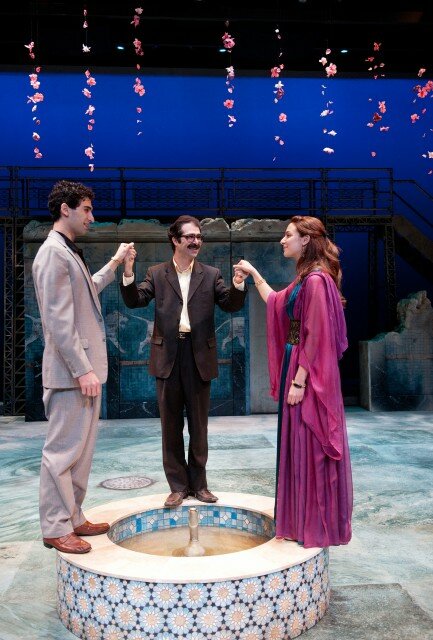Living in Seattle affords one certain opportunities– selection of breweries, assortment of strange persons with whom to share your evening, and an eight hour proximity to the Oregon Shakespeare Festival (by 1992 Honda Civic).
As my budget allows, I like to visit Ashland to take inappropriate advantage (my hand is so far up this skirt, I should probably pay for dinner) of this proximity to sleaze it up for three days. There’s nothing I enjoy more than driving down to Ashland for a week of good theatre, and I mean really fucking good theatre.
The plan is simple: five or six shows in three days spending as little money as possible. Gas is generally the biggest budget buster because if you plan in advance you can score $20 tickets to all the performances. Get a hotel in a mile and half radius and you don’t have to pay for parking (I like the Manor Motel, but there are number of cheap options usually looking crumbly next to the expensive ones). Add a fridge in your hotel room, and you don’t even have to buy meals. But it is a vacation so finding cheap, delicious food that isn’t cold or doesn’t come from a gas station is kind of awesome.

My first day in Ashland started off with a matinee performance of Romeo and Juliet (running through Nov. 4th; tickets) at the Angus Bowmer Theatre. My associations with Romeo and Juliet are fairly similar to most people’s. It’s probably the only Shakespeare I saw for the first fifteen years of my life. It was a staple of community theatres, high school workshops and various repertories in the immediate vicinity, and it was assigned reading in middle school. However, the benefit of R&J is universal understanding of what’s going to happen. There is no surprise twist.
The negative, of course, is that because it’s so well known, your audience has a few more expectations. What you hope is that your lovers are believable and the fights are well-choreographed. The only thing that can truly destroy an R&J production out of the gate (besides the aforementioned) is a poorly executed backdrop. I once saw a beach bum themed production of Twelfth Night if you need a reference for this, or there’s the horror of Hamlet in space.
Luckily, this production decided to use the end of the mission era in the California Territory (not yet a state) circa 1847. The two sides are well to-do families of “mixed ethnic descent” but without the political annoyance of the Gold Rush beginning. Integration of various Spanish words like “mija” and Spanish pronunciations of names added a tender dimension that still scanned correctly (it’s a huge pet peeve of mine when directors change Shakespeare’s names and then they don’t scan properly, see: Lysander becoming Lysandra).Wonderfully acted, directed, and designed Romeo and Juliet delivered on most counts.
Daniel Jose Molina’s Romeo was wonderfully captivating with just the right touch of nerdiness, and more than a fair share of teenage hormones. The high school group in the audience particularly liked seeing him half-naked, kissing Alejandra Escalante (Juliet), but as I was sitting next to his mother (I’m serious) I don’t feel comfortable mentioning such things. Unsurprisingly, he’s a good looking guy.
His talent was surprising. Hoo boy. Molina has some chops to spare. Because I was sitting next to his mother, I know that he’s recently out of school, and that he was born in the Dominican Republic. (I wish I had some embarrassing stories accompanied with baby pictures, but I was sitting next to his mother, not mine.)

Directed by Laird Williamson, the production was beautifully staged taking into account small moments of storytelling. I particularly enjoyed the man who was really unsure of the choreographed steps at the party. He kept looking shyly at his feet with his pretty partner prompting him to look at her. Considering most choreographed dance pieces involve all revelers moving perfectly in unison, I enjoyed this small bit of interest.
The balcony scene was also delightfully awkward, as it should be, with Juliet performing the insecure schoolgirl talking to herself and trying to be sexy as she pretends Romeo’s hand is on her face. Again, I have to nod at Molina for running back, forth, and falling hopelessly to the ground when he can’t kiss her. I laughed a lot during this scene, and I hate things.
Isabell Monk O’Connor’s Nurse delivered as the loving fool who’s wiser than you think. And it is her reaction to Juliet’s death more than anyone else’s that broke my heart.
Fearing that the costumes (designed by Susan Tsu) would be muted, I was delighted with the use of reds and browns. All the men had an inset V in their pant legs with silver buttons trailing up the sides, and most wore spurs on their boots. Sashes of gold and maroon off-set the tans well enough to establish a little bit of fabulousness when needed. I was a little disappointed in the seeming lack of bright colors on the females, but their dresses were lovely all the same.
The set (designed by Michael Ganio) were thin, climbable wood-slats in two half circles (one of which could move) and a simple raised oval in the middle. The sparseness of the stage was wonderful, and though I couldn’t see it fully from where I was sitting, the projections on the cyc looked lovely.
The negatives I have about the show were entirely based on my location in the house. Because they were using a partial circular thrust, and because I purchased my $20 cheap seat ticket (so I really can’t complain, but I will anyway) I missed a couple of moments I would have liked to see. Most of these moments happened downstage center, like the first kiss at the party, the Queen Maab speech (my favorite), and the prologue.
I didn’t care for the use of the skull masks when Juliet foreshadows Romeo’s demise after their fierce night of wedded lovemaking, but the director made a justification for it by using them in the tomb as well. The masks seem to invoke the day of the dead, which makes sense in the context of the period, however, because there were no other elements of non-reality, the choice felt lacking.
Also, a note to patrons: Please don’t touch someone you don’t know in the middle of a show, or throughout a show. And no matter what, please don’t mention anyone’s genitalia, especially when you’re sitting next to said person’s mother. I swear, the other woman sitting next to me (clearly, not Molina’s mother) had some boundary issues.
Moving on.

After a matinee performance, you might feel inclined to spend money on a beverage. I know. Crazy. If you do, the happy hour I recommend is at a place called The Playwright. Besides the obviously pandering name, the happy hour (4-6pm) was relatively decent $3.50 for a 20 oz Mac & Jack, and $6 for an incredibly large (20 pieces) plate of spicy chicken wings that I was tempted to finish in one sitting (I couldn’t entirely, but I came close).
If you can’t go for happy hour, I’d skip it. The food was just typical pub fare with kitschy names like “Playwright’s Wings” (hot wings) or “Poor Playwright’s Wings” (fries with hot sauce and bleu cheese), and the regular prices were too expensive to justify for pub food. But happy hour is the great forgiveness for sub-par, or regularly par, or just par food (I don’t understand golf).
The great thing about this pub is that it’s far enough away from the main festival street that it was almost completely empty for happy hour. I hate people. Well, I hate some people. I like to drink, eat, read, write in peace. The Playwright was quiet and devoid of people asking me things (or touching me while I’m trying to watch, or read something– yes I’m still bitter at you, old woman at R&J). Win. The music playing was a little 90s, but I didn’t mind, though I did hear someone else complain about it.
Next up was the evening performance of Troilus and Cressida (through November 4th; tickets) because I wanted to get my and performances out in one day, and be really sad (which is why I went to a pub at 4pm). Seriously, this was my day of death and tragedy. Troilus and Cressida is not a happy play despite being really funny. It’s the kind of funny you wish wasn’t funny, or is trying so hard to be funny because in a minute the person you’re laughing at is going to die in a really horrific way.

Troilus and Cressida was performed at the New Theatre. Holy Jesus God do I love this theatre. This blackbox is almost too fancy to be a blackbox. In my day (being today) a blackbox was a black concrete slab with sound boxes on the side and a jerry-rigged sound system with castaway lights no one wants. Not at OSF. No. This blackbox has traps, and a really impressive grid, and ponies. Bastards. I want to live in this theatre… I digress.
The challenge with Troilus and Cressida is that not many people know the story, and even if they do, it’s complicated because it’s the Trojan War. This means there are a lot of characters who are equally important and say weighty things, and then disappear for two acts, and then come back at the end to blow your mind, or blow you up. It might be called Troilus and Cressida but they aren’t in the play as much as you might think, and they don’t have nearly as much importance as Romeo and Juliet to the forward momentum of the story.
The basic idea behind Troilus and Cressida is to tell you war is bad. Do you understand that? War is the opposite of goodness. People fighting in a war don’t really want to fight it, but they will find reasons to keep fighting in it, which is how you can have wars that go on for years, and this is not good. See? Now you know.
What’s awesome about Troilus and Cressida is that Cressida is a badass. I mean a really awesome, female character who actually says funny, smart things, and doesn’t want to be owned, but who also understands that she’s a woman in an era when women can’t do anything about it; she’s stuck, so she’s gotta do what she’s gotta do; she’s going to survive. Cressida is way cooler than your mom. She’s not cooler than my mom, but she’s definitely cooler than yours.
Troilus, on the other hand, is a douche (see: tool of the patriarchy).

Directed by Rob Melrose, this production is set contemporarily with inspiration taken from the Baghdad Museum looting. Interestingly, Melrose says in the program that he’s using the Trojan War “as the beginning of a long history of East-West conflicts: the Persian Wars, the Crusades, the Vietnam War, the Gulf and Iraq Wars.”
This premise interested me immediately especially since none of the characters are inherently (or remotely) likeable. But you like them anyway. It’s that whole reality TV show thing– you can’t look away, and for some reason, you’re kind of routing for the jerk.
Particularly captivating were the brief and subtle moments between Achilles (performed by the masterful Peter Macon) and Patroclus (performed by the sweetly charming Ramiz Monsef). You might want to sit down for this (or, readjust in your chair): Shakespeare wrote a queer relationship. I know. It kind of blows your mind. And he wrote about it being between a tough-as-nails, badass warrior Achilles, and a softer warrior/companion, Patroclus. Though the text only mentions it once or twice, and their onstage affair is never directly seen (i.e., there’s no Romeo and Juliet-like affection), the staging of their relationship is still resoundingly sweet, even if it was written to be contemptible.
Barzin Akhavan’s performance of Pandarus was equally charming as the uncle trying so hard to get Troilus and Cressida to bone, though Akhavan did sound like he was going hoarse. And Elijah Alexander’s Ajax made me wish the dopey fighter would win the day in the end. Alas, alack.
The transformation of the set (designed by Michael Locher) into the orchard by simply lowering some fake pink flowers on strings and adding a fountain was surprisingly affecting. I don’t like to admit that my heart pitterpatters, but it did then, which is fitting since that’s when the lovers finally get together.
Also of note was the light design by Jiyoun Chang, who actually made me believe there was a pool on stage to the point where I kept thinking, “If that actor steps one more foot, they’ll be soaked.” Then I slapped myself, and I was better.
The difficulty with this piece is that the story jumps around a lot, and the lovers you’re routing for dissolve before the climax, so by the end you’re essentially watching several fight scenes that have characters you care little about, which means their deaths aren’t nearly as tragic.
I will again nod to Macon though, who made me care about his pain over Patroclus’ death. So, yeah. Kill Hector. That will make us feel better. But then Hector gets dragged around by a car (off stage) so that’s not as happy.
Thus ended my first day at the Oregon Shakespeare Festival. Stay tuned for reviews of Animal Crackers, Medea/Macbeth/Cinderella, The White Snake, and Seagull.